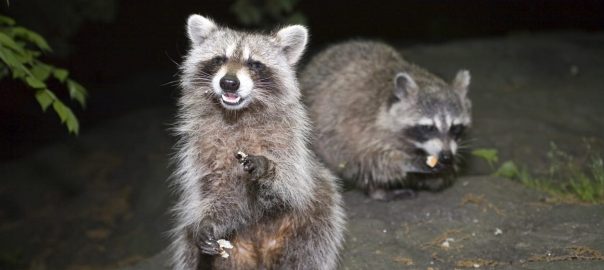Do Raccoons Live in Sewers?

Over the years, rural and urban development has disturbed the natural habitat for many wild animals, including raccoons. When forestry is destroyed in place of homes and businesses, raccoons must either seek out a new wooded area or adapt to their new surroundings. Fortunately for raccoons, they are good at adapting and can reside in some unpredictable places.
Although raccoons prefer wooded areas close to lakes or streams of water, they can adapt to live in rural and urban areas. Of course, you might wonder where exactly they find residence in busy populated areas. If you have ever walked by a sewer drain, perhaps you have seen a raccoon sitting in the opening, but is that where they make their den?
Sewer Drains
Raccoons scavenge for their food by whatever means necessary. It is much easier for them to find food in the wild. That is not to say that they cannot easily find food among urban and rural settings. Humans drop food all the time, or they throw half-eaten food into the trash, making it easy for a raccoon to find food and survive.
Food will often float into sewer drains and down into the sewers. If necessary, a raccoon will make its way into the sewer to forage for food to survive. Their ultimate goal is to scavenge enough food and water to survive, just as any living creature would do.
However, foraging for food in the sewers and sewer drains and living in the sewers are two completely different scenarios. Raccoons do not make dens in sewers. They simply go down to the sewers in search of food when necessary, or they grab scraps of food as they float into the openings of sewer drains.
Habitats
Raccoons that live in the forest will create a burrow, or they will den inside tree stumps and hollowed out trees. Raccoons living among urban and rural settings, however, do not have the comfort of forestry to make dens and burrows. Instead, they must adapt and use anything that is available to them to make a home.
For that reason, they will make dens under porches and decks, inside abandoned cars, and underbrush piles. They will not, however, make a den for themselves in the sewers. Rats and other vermin often live in the sewers. Although raccoons will eat rats if necessary, their preference is not to live among them.
Therefore, if you see a raccoon in the opening of a sewer drain, it is likely there scavenging for food rather than making its way home. Make sure you never attempt to feed a raccoon. In fact, you should stay far away. Raccoons carry diseases easily transmitted to humans that can prove dangerous. Instead, move along and keep on your way and the raccoon will do the same without pestering you. Call raccoon removal services provided by Wildlife Shield if you need help with raccoons.